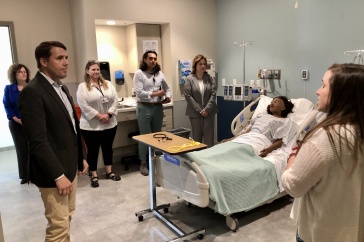A new program from Professional Development and Training aims to help experts identify those individuals at risk of addiction before they start taking drugs and keep those who are in recovery from relapsing.

“Coaching Youth at Risk of Addiction” was created by licensed psychologist Anita Remig, a former UNH adjunct faculty member. Multiple instructors with UNH Professional Development and Training who are experts in the field of social work and counseling will teach the course. Of the curriculum, Remig says she relied heavily on data from the Substance Abuse and Mental Health Services Administration, whose mission is to reduce the impact of substance abuse and mental illness on America's communities.
“The question is, how do we get these conversations going with kids and keep them going?” Remig says. “We want to help the professionals — educators, school social workers, paraprofessionals, people who have constant contact with kids — identify addiction potential and give them the tools to respond.”The coaching program will help educate individuals working with children and teens to the biological, environmental, psychological and family risk factors associated with addiction, while also teaching them how to motivate vulnerable youth to stay connected to people and activities that promote sobriety.
The certificate program has six required day-long workshops and two electives. Participants take the workshops, offered in the spring and fall, that fit their schedule and complete the certificate at their own pace.
Workshops include such topics as defining addiction and why it matters, ethics and boundaries, coaching techniques and theories and skills of crisis intervention.
“The purview of coaches is to help people set goals and then break them down into strategies and tactics that will move youth closer and closer to their hopes and preferred future,” Remig says.
According to the certificate program description, drug and alcohol abuse are often chronic conditions with occasional relapses. Treatment is typically a long-term process that involves multiple interventions and regular monitoring. What’s more, methods can vary depending on individual needs and, often, the types of drugs one has been using.
“There are a few other university life coaching programs, but I have not been able to find any programs devoted to addiction coaching,” Remig says.? “I think the UNH program is a leader in training professionals in addiction coaching.”
Check out the list of workshops and?register here.
-
Written By:
Jody Record ’95 | Communications and Public Affairs | jody.record@unh.edu



















































